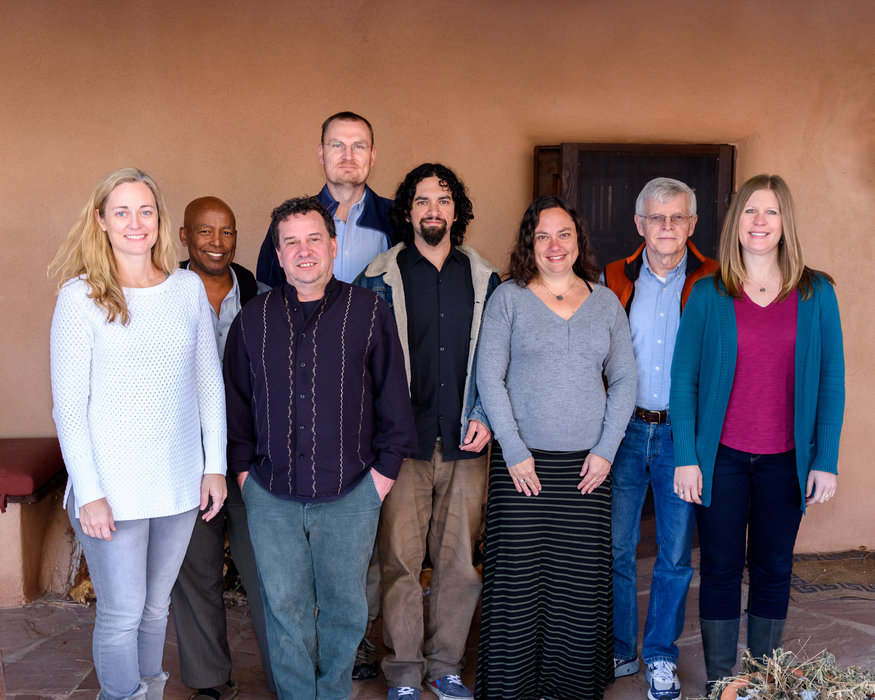
Linking the Past to the Future: 2000 Years of Human Resilience and Socioecological Change in the Central American Tropics
Co-chaired by Rebecca Zarger and Keith Prufer.
January 26–28, 2016
Linking the Past to the Future: 2000 Years of Human Resilience and Socioecological Change in the Central American Tropics
New assessments of global environmental change and resilience suggest that linking past to present human experiences offers critical opportunities to further human understanding of unparalleled ecological crises. What has enabled human societies to respond to environmental change and sustain their way of life during the time period now known as the Anthropocene? How do humans respond to uncertainty when confronting gradual change versus rapid environmental change?
This seminar brought together researchers from the NSF Human Social Dynamics project (Development and Resilience of Complex Socioeconomic Systems, 2008-2013) focused on understanding environmental change and human-environment relations in southern Belize. The primary goal was the modeling of dynamic human behavioral responses to environmental transformation, and linking these processes to climate dynamics, patterns of settlement, resource exploitation, agricultural intensification, competition, and polity stability. Each collaborator brought rich datasets and insights gained from many years of field and laboratory studies in southern Belize to the discussion. These included high-resolution cultural chronologies, paleoclimate and paleoecological records, new models of demographic transitions and social complexity, longitudinal behavioral observations, oral histories of land use change, and decades of ethnographic data.
Given the wide range of disciplines and disciplinary approaches represented, the spectrum of ideas that emerged from presentations and discussions was quite broad in scope. Some of the emergent questions that resulted from these discussions included:
- How can we integrate geospatial records with time allocation and archaeological data, to learn more about socio-ecological dynamics and resilience in current and past tropical contexts?
- Is it possible to carry out a comprehensive analysis of household structure, the seasonality of time allocation, and labor bottlenecks in subsistence production as a means of assessing opportunities for intensification in directions documented or proposed in prehistory?
- What are the effects of globalization and intensive use of agrochemicals on Maize production in southern Belize, as compared to the ancient past?
- How can we create a regional, paleoclimatological-archaeological analysis of environmental productivity with historical depth?
- How can we contribute insights into land use and land management policies, and responses to climate and environmental change, making findings across the project relevant to local communities and various publics?
Seminar co-chairs, Keith Prufer and Rebecca Zarger, outlined what is next for the project, “First, we plan to produce a series of multi-authored articles reflecting the relative interests of those who work with datasets grounded primarily in the past (climate, ecology, prehistory) and those who work primarily in the present (ethnohistory and ethnography). Second, these articles will be written with the goal of integration of the past- and present-focused works into a highly synthetic and integrative group paper involving all participants. The third and ultimate outcome of the seminar is a group commitment to making our research about the distant and not-so-distant past relevant to the future of humans on earth by engaging in a collaborative process that links past behavioral responses to change to current challenges, and by exploring opportunities to inform policy and decision making in a time of unprecedented rapid change.”
Keith M. Prufer, Chair
Associate Professor, Department of Anthropology, University of New Mexico
Rebecca Zarger, Chair
Associate Professor, Department of Anthropology, University of South Florida
Yemane Asmerom
Professor, Department of Earth and Planetary Sciences, University of New Mexico
Kristina Baines
Assistant Professor, Department of Anthropology, City University of New York at Guttman College
Sebastian Breitenbach
Research Associate, Godwin Laboratory for Palaeoclimate Research, Cambridge University
Brendan Culleton
Research Associate, Department of Anthropology, Pennsylvania State University
Douglas J. Kennett
Professor, Department of Anthropology, Pennsylvania State University
Luis Pacheco-Cobos
Investigador T.C., Facultad de Biología – Xalapa, Universidad Veracruzana
Megan Walsh
Assistant Professor, Department of Geography, Central Washington University
Bruce Winterhalder
Professor Emeritus, Department of Anthropology, University of California at Davis
Generous funding provided by the National Science Foundation
